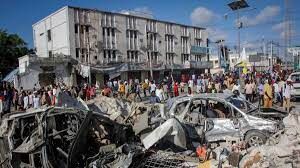Devastating Suicide Bombing Shakes Mogadishu, Al-Shabab Claims Responsibility
A devastating suicide bombing in Mogadishu, Somalia, targeting a busy tea shop near the parliament and the president's office took place. Al-Shabab claims responsibility, highlighting the ongoing security challenges in the country.
In a devastating act of violence, a suicide bomber targeted a busy tea shop in Somalia's capital, Mogadishu, killing at least seven people and injuring several others. The attack took place at a checkpoint near the parliament and the president's office, frequented by soldiers and civilians alike. The Al Qaeda-linked group, al-Shabab, claimed responsibility for the attack, further exacerbating the fragile security situation in the country.
According to witnesses and medical personnel at the scene, the explosion occurred in the afternoon, when the cafe was crowded with people enjoying tea and chewing khat, a mildly narcotic native shrub. Sadik Ali, the police spokesperson, confirmed that the blast killed five people on the spot, with six others sustaining injuries.
The suicide bomber was identified as a member of al-Shabab, referred to by the government as "Kharijite terrorists." The attack came just a day after a deadly car bombing near a market in central Somalia, which claimed the lives of five civilians and left 13 others wounded.
#Somalia A suicide bombing kills six people and wounds six others in the Somali capital, Mogadishu. pic.twitter.com/x0zVdIXuoX
— N I L E_A L E R T S (@NILEALERTS) September 29, 2023
Additionally, earlier in the week, a truck bombing in the town of Beledweyne resulted in the deaths of 21 individuals and caused extensive damage to buildings. These recent attacks highlight the persistent threat posed by al-Shabab, an extremist group that seeks to overthrow the central government and impose its own interpretation of Islamic law.
Despite the efforts of the Somali government, which launched a major offensive against the group last year with the support of African Union troops and US airstrikes, al-Shabab maintains control over certain rural areas. President Hassan Sheikh Mohamud, who assumed office last year vowing to wage a "all-out war" against the terrorist organization, has acknowledged the challenges faced in combating al-Shabab.
The government continues to face significant setbacks in its fight against the group, evident in the recent wave of attacks. The international community must step up its support to Somalia in its fight against terrorism, providing not only military assistance but also resources for development and stability. It is crucial to address the root causes of extremism and strengthen security institutions to ensure the safety and well-being of the Somali people.




